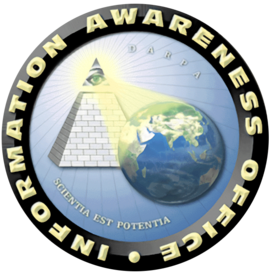‘God is dead. God remains dead. And we have killed him. Yet his shadow still looms.’ — Nietzsche, The Gay Science.
‘In one period of experimentation with acid, Barrett and another friend, Paul Charrier, end up naked in the bath, reciting: “No rules, no rules”.’ – Manning, Toby (2006). The Rough Guide to Pink Floyd.

Taken from Boing Boing
Ok here we go… I had a dream last night – I was in a large, old-fashioned wood-panelled library; on the wall was a painting of a mischievous looking wizard – in appearance something like a cross between Alan Watts and Gandalf as played by Sir Ian McKellen. He was winking. The painting was somehow alive, and I realised that he was watching me – I ducked under the large wooden table which occupied the centre of the room (not unlike the table in Da Vinci’s painting of The Last Supper) and his eyes followed me down there. On waking, I realised that this paternal figure represented God and his omniscience – he knows everything we do, he is watching all the time, he knows when we’ve been bad or good, so be good for goodness’ sake (or was that a different conditionally-loving Father-figure?).
So Nietzsche told us that God is dead, in other words: no one is watching us, there is no sin, no external judgement – this was his reaction to contemporary discoveries in science, in as much as we realised that any potential god is not to be found in the immediate physical vicinity. We know he is not sitting on a cloud just out of sight, and the theory of evolution means we can explain how we got here without an external Creator.
I am very fond of the YouTube videos of a man called Benjamin Smythe – he often repeats the phrase ‘No-one is coming’, by which I understand him to mean that no-one is coming to save us, we have to do it ourselves, but also that no-one is coming to judge us, we are free to do as we like.
The implications of this, if taken fully to heart, can be summed up in one word: freedom. But as the 70s jazz rocker Stomu Yamash’ta noted in an album title, ‘Freedom is Frightening’. It sure is – if we are alone here, and there really are no rules other than the ones we’ve created for ourselves, in other words the rules we more or less arbitrarily made up, and no-one is coming to save us, not Jesus, not the ETs, not Ronald Fuckin’ McDonald, then it’s basically all up for grabs – with all the ‘good’ and ‘bad’ consequences that implies (of course our notions of ‘good’ and ‘bad’ themselves are part of the made-up rules too).
So into the void of no-gods has stepped the modern technological secular state – in its unholy marriage with large corporations it is not (yet) omnipotent, but seems to regard itself as such to all intents and purposes, and it is certainly now taking king-sized steps towards omniscience – it is watching us all the time, as made overtly clear by the infamous, almost a parody of itself, GW Bush era logo of the Information Awareness Office project (presumably made secret and renamed PRISM after an unexpected public backlash into the idea of all communications being intercepted by the government):

I don’t want to go too far down the occult conspiracy theory rabbithole but as a sidenote ‘IAO’ was the name for a Crowleyan magickal formula for contacting one’s Holy Guardian Angel – without the obviously occultist logo I would have just dismissed that as a coincidence, but with it, there is ample backup for believing that this worldwide surveillance project was consciously intended as a kind of god-replacement. The slogan, Scientia est Potentia (Knowledge is Power) seems to add further weight to this – when we have the knowledge of Everything, we will be All Powerful. The eye in the pyramid is, in Masonic mythology, of course supposed to be that of the Architect of the Universe, i.e. God. The traditional geometrical shape for a PRISM is triangular (pyramid).
So… we feel lost and alone in the universe with no handed-down rules set in stone, and no-one looking out for us. Rather than rejoicing in the realisation that: there is no sin in reality, we are free, and choosing to evolve into a future where we recognise that we own our power and develop our powers of negotiation in order to improve the arbitrary rules by which we live, we choose to recreate the Nitzschean ‘shadow of God’, the judgemental patriarch who is always watching us, ready to reward the obedient with cheap credit, access to politicians, and all manner of toys, and damn the infidels with water cannons, tear gas -and if we really displease Him, rendition, secret prisons, and waterboarding.
